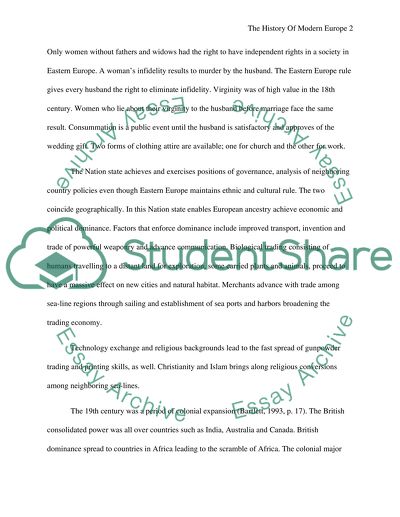Cite this document
(“The history of modern Europe can be described as the failed attempt to Essay”, n.d.)
The history of modern Europe can be described as the failed attempt to Essay. Retrieved from https://studentshare.org/history/1644013-the-history-of-modern-europe-can-be-described-as-the-failed-attempt-to-re-establish-universal-rule-over-the-continent-discuss-the-tension-between-and-interdependence-of-the-ideas-of-empire-and-of-the-nation-state-in-19th-century-europe
The history of modern Europe can be described as the failed attempt to Essay. Retrieved from https://studentshare.org/history/1644013-the-history-of-modern-europe-can-be-described-as-the-failed-attempt-to-re-establish-universal-rule-over-the-continent-discuss-the-tension-between-and-interdependence-of-the-ideas-of-empire-and-of-the-nation-state-in-19th-century-europe
(The History of Modern Europe Can Be Described As the Failed Attempt to Essay)
The History of Modern Europe Can Be Described As the Failed Attempt to Essay. https://studentshare.org/history/1644013-the-history-of-modern-europe-can-be-described-as-the-failed-attempt-to-re-establish-universal-rule-over-the-continent-discuss-the-tension-between-and-interdependence-of-the-ideas-of-empire-and-of-the-nation-state-in-19th-century-europe.
The History of Modern Europe Can Be Described As the Failed Attempt to Essay. https://studentshare.org/history/1644013-the-history-of-modern-europe-can-be-described-as-the-failed-attempt-to-re-establish-universal-rule-over-the-continent-discuss-the-tension-between-and-interdependence-of-the-ideas-of-empire-and-of-the-nation-state-in-19th-century-europe.
“The History of Modern Europe Can Be Described As the Failed Attempt to Essay”, n.d. https://studentshare.org/history/1644013-the-history-of-modern-europe-can-be-described-as-the-failed-attempt-to-re-establish-universal-rule-over-the-continent-discuss-the-tension-between-and-interdependence-of-the-ideas-of-empire-and-of-the-nation-state-in-19th-century-europe.


